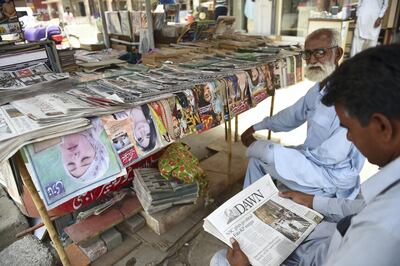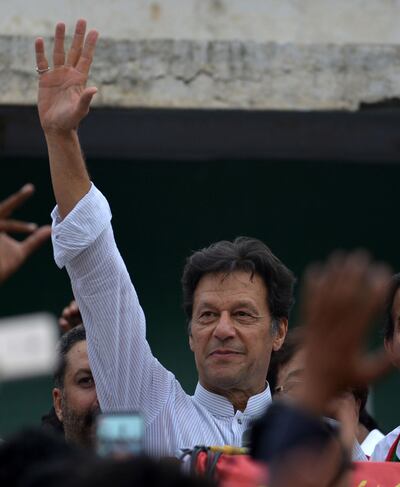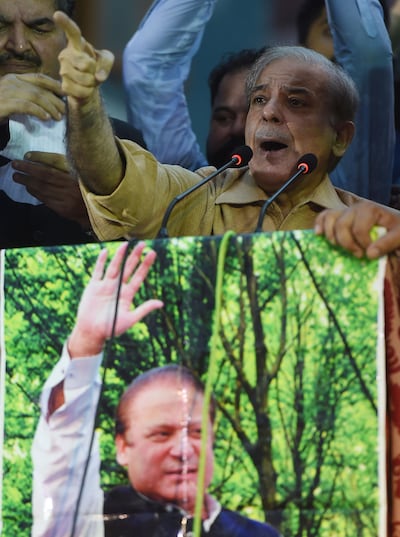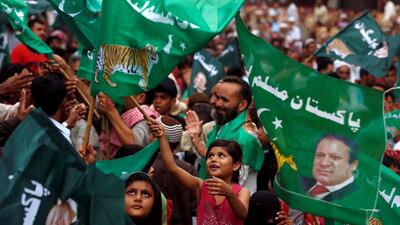Each night for more than 70 years, copies of Dawn, Pakistan's oldest and most widely read English newspaper, have rolled off presses bound for all four corners of the country.
The Karachi-based title was started by the nation's founder, Mohammad Ali Jinnah, and has long been influential. Even in the internet age it sells up to 125,000 copies daily.
Yet for the last month, as vans have driven out of three production sites, it has been unclear how many of those papers will reach readers.
The newspaper's management says distribution has been sabotaged, its hawkers intimidated and journalists threatened in a concerted campaign that should "concern all free-thinking and democratic citizens of the country".
Dawn's troubles are part of a wider confrontation between Pakistan's media and parts of the security establishment, analysts and media freedom campaigners say, as a general election approaches.
The July 25 vote will be the first time the country has held three consecutive elections without a coup, but the military maintains considerable sway and is accused of using its weight to ensure a biddable government takes power.
In the past year, media critics of the military have found themselves abducted, taken off air and threatened. The long-running animosity from top generals towards ousted prime minister Nawaz Sharif – they toppled his first government in a coup in 1999 – has seen particular focus on those who lean towards his Pakistan Muslim League or give him a platform.

"It's been a long process of slowly ratcheting up pressure, mainly coming from the military to shape the coverage that's coming out," said Steven Butler, Asia coordinator of the Committee to Protect Journalists.
"The military is very sensitive about what is written about it and very strongly against Nawaz Sharif and appears to be taking action against his party."
He said after censorship under military rule, until recently Pakistan had appeared to be on a path, albeit slow and bumpy, towards greater press freedom.
That had now become "an environment where there's a ratcheting up of pressure through the owners of media properties and selective attacks on journalists".
Mr Sharif's difficulties were magnified on Thursday with a Supreme Court ruling against his party that barred one of his former ministers from contesting the election. That came a day after an election commission tribunal said the outgoing prime minister Shahid Khaqan Abbasi, who took over from Mr Sharif, could not contest his home constituency, although he will stand in another seat in Islamabad.
___________
Read more:
Pakistan's top court, election panel deal fresh blows to Sharif's party
___________
Mr Sharif and his party have termed the cases and other several measures as a pre-election attempt to tip the scales in favour of opposition politician and national cricket hero Imran Khan.

Dawn says its troubles began with a October 2016 report that the civilian government led by Mr Sharif had confronted the military over its alleged sheltering of militants. The stance risked making Pakistan an international outcast, civilian leaders had reportedly told generals. That piece prompted a furious backlash.
Mr Sharif was ousted last July after the Panama Papers leak linked his children to offshore companies. And he was disqualified from office when a court ruled he was dishonest in not disclosing his earnings from a Dubai-based company in his nomination papers.
Pressure on Dawn grew last month when Mr Sharif suggested in an interview with the paper that Pakistani militants were behind the 2008 Mumbai attacks.
Since then distribution has been badly disrupted across parts of the country, management says. Papers have been blocked from military areas, copies confiscated and newspaper sellers intimidated.

Hameed Haroon, the chief executive of Dawn Media Group, said: "Clearly big institutions are involved. Civilian officials of the government are not involved, therefore we have reasons to believe elements of the military are taking this action."
The paper is not taking the disruption without a fight.
"One of the casualties of civil-military discord and strife in this country has been a free media that has embraced constitutional civilian supremacy," an editorial published on Wednesday said.
"It appears that elements within or sections of the state do not believe they have a duty to uphold the Constitution and the freedoms it guarantees."
____________
Pakistani politicians' asset declarations reveal deep pockets
____________
The editorial also urged the country's highest authorities to take note and intervene.
A message earlier in the week to frustrated subscribers who may not be getting their copies likened their struggle to the censorship faced by Mr Jinnah as he campaigned before Independence.
Other outlets under pressure have included Pakistan's most popular television station Geo TV. The broadcaster was largely taken off cable networks at the end of March and only returned after it was widely reported to have agreed to stop favourable coverage of Mr Sharif and halt attacks on the military.
Individual journalists have also faced action.
Gul Bukhari, a British Pakistani journalist who has criticised the army was abducted by unnamed men earlier this month as she drove to a television studio in Lahore. She was released unharmed hours later.
Marvi Sirmed, a journalist and rights activist, who has promoted friendlier ties with India and criticised militant groups with links to the security forces, earlier this month said she had returned from holiday to find her home ransacked. Laptops and documents were taken, but not jewellery.
Pakistan's army denies it is involved in intimidation.
"We are the strong supporters of democracy," Gen Asif Ghafoor told the Associated Press earlier this week.
"But the army is the most organised and capable institution with the ability to assist."

